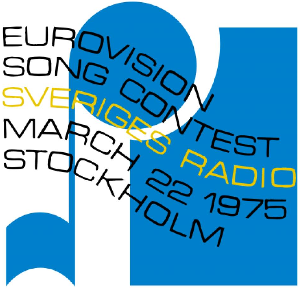
The Eurovision Song Contest 1974 was the 19th edition of the Eurovision Song Contest, held on 6 April 1974 in the Dome in Brighton, United Kingdom. Organised by the European Broadcasting Union (EBU) and host broadcaster the British Broadcasting Corporation (BBC), and presented by Katie Boyle, this was the fifth time that the United Kingdom had staged the contest.

The Eurovision Song Contest 1975 was the 20th edition of the Eurovision Song Contest, held on 22 March 1975 in the Sankt Eriks-Mässan in Stockholm, Sweden. Organised by the European Broadcasting Union (EBU) and host broadcaster Sveriges Radio (SR), and presented by Karin Falck, the contest was held in Sweden following the country's victory at the 1974 contest with the song "Waterloo" by ABBA.
The United Kingdom held a national preselection to choose the song that would go to the Eurovision Song Contest 1968.
The United Kingdom held a national preselection to choose the song that would go to the Eurovision Song Contest 1970.
The United Kingdom held a national preselection to choose the song that would go to the Eurovision Song Contest 1972.
The United Kingdom held a national preselection to choose the song that would go to the Eurovision Song Contest 1973.
The United Kingdom held a national pre-selection to choose the song that would go to the Eurovision Song Contest 1974.
The United Kingdom held a national pre-selection to choose the song that would go to the Eurovision Song Contest 1975.
The United Kingdom held a national preselection to choose the song that would go to the Eurovision Song Contest 1976.
The United Kingdom held a national preselection to choose the song that would go to the Eurovision Song Contest 1977, which was held in Wembley, London following the United Kingdom's victory in the previous year's contest.
The United Kingdom held a national preselection to choose the song that would go to the Eurovision Song Contest 1978. It was held on Friday 31 March 1978 at the Royal Albert Hall and presented by Terry Wogan. The songs were backed by the Alyn Ainsworth Orchestra.
The United Kingdom held a national preselection to choose the song that would go to the Eurovision Song Contest 1979. A Song for Europe 1979 was planned to take place at the Royal Albert Hall in London on 8 March.
The United Kingdom was represented in the Eurovision Song Contest 1982 by Bardo with the song "One Step Further". It was chosen as the British entry through the A Song for Europe national selection process and placed seventh at Eurovision, receiving 76 points.
The United Kingdom selected their entry for the Eurovision Song Contest 1996 in Oslo, Norway with a new show, The Great British Song Contest. The winning entry was Gina G with "Ooh Aah... Just a Little Bit".
Sweden did not compete in the Eurovision Song Contest 1970, as a protest against that four countries shared the victory the preceding year. They were, however, back for the 1971 contest. Five semi-finals were held, with the same three competitors in all of them, as part of the popular TV show Hylands hörna. The group Family Four won all of the semi-finals, and therefore sung all the songs in the final. The song "Vita vidder", written and composed by Håkan Elmquist, won and represented Sweden at ESC, held in Dublin.
The Netherlands was represented by Saskia and Serge, with the song "Tijd", at the 1971 Eurovision Song Contest, which took place on 3 April in Dublin. The song was the winner of the Dutch national final for the contest, held on 24 February. Saskia and Serge were selected internally by broadcaster NOS as the 1971 performers; it is widely thought that this was done in response to the 1970 preselection in which the couple's song "Spinnewiel" was placed runner-up by the juries despite being the overwhelming favourite of the Dutch public.
Norway was represented by 15-year-old Hanne Krogh, with the song "Lykken er", at the 1971 Eurovision Song Contest, which took place on 3 April in Dublin. "Lykken er" was chosen as the Norwegian entry at the Melodi Grand Prix on 20 February.
Portugal was represented for the second time by Carlos Mendes, with the song "A festa da vida", at the 1972 Eurovision Song Contest, which took place on 25 March in Edinburgh. "A festa da vida" was chosen as the Portuguese entry at the Grande Prémio TV da Canção Portuguesa on 22 February.
Portugal was represented by Tonicha, with the song "Menina do alto da serra", at the 1971 Eurovision Song Contest, which took place on 3 April in Dublin. "Menina do alto da serra" was chosen as the Portuguese entry at the Grande Prémio TV da Canção Portuguesa on 11 February.
Finland was represented by Markku Aro and Koivistolaiset, with the song "Tie uuteen päivään", at the 1971 Eurovision Song Contest, which took place on 13 April in Dublin.

